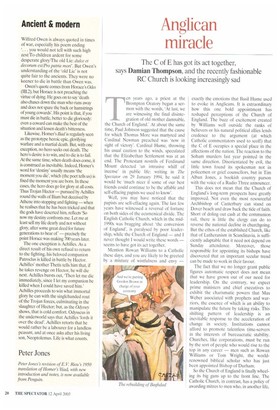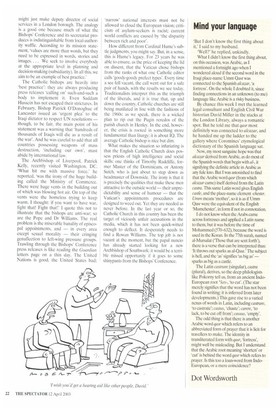Anglican miracle
The C of E has got its act together, says Damian Thompson, and the recently fashionable RC Church is looking increasingly sad T, en years ago, a priest at the Brompton Oratory began a sermon with the words, 'At last, we are witnessing the final disintegration of old mother damnable, the Church of England.' At about the same time, Paul Johnson suggested that the cause for which Thomas More was martyred and Cardinal Newman preached was 'now in sight of victory'. Cardinal Hume, throwing his usual caution to the winds, speculated that the Elizabethan Settlement was at an end. The Protestant nostrils of Ferdinand Mount detected 'an intrusive whiff of incense' in public life: writing in The Spectator on 29 January 1994, he said it would be 'much nicer if some of our best friends could continue to be the affable and self-effacing papists we used to know'.
Well, you may have noticed that the papists are self-effacing again. The last few years have witnessed a reversal of fortune on both sides of the ecumenical divide. The English Catholic Church, which in the mid1990s was bragging about 'the conversion of England', is paralysed by poor leadership, while the Church of England — and I never thought I would write these words — seems to have got its act together.
Mention Rowan Williams to a Catholic these days, and you are likely to be greeted by a mixture of wistfulness and envy — exactly the emotions that Basil Hume used to evoke in Anglicans. It is extraordinary how this one bold appointment has reshaped perceptions of the Church of England. The buzz of excitement created by Williams well outside the ranks of believers or his natural political allies lends credence to the argument (at which Catholic commentators used to scoff) that the C of E occupies a special place in the affections of the nation. The reaction to the Soham murders last year pointed in the same direction. Disorientated by evil, the little town found its spokesman not in policemen or grief counsellors, but in Tim Alban Jones, a bookish country parson with the voice of a Radio Three announcer.
This does not mean that the Church of England's long-term prospects have greatly improved. Not even the most resourceful Archbishop of Canterbury can stand on Dover beach and draw back the tide of faith. Short of doling out cash at the communion rail, there is little the clergy can do to reverse the national decline in churchgoing. But the ethos of the established Church, like that of Lutheranism in Scandinavia, is sufficiently adaptable that it need not depend on Sunday attendance. Moreover, those responsible for appointing its bishops have discovered that an important secular trend can be made to work in their favour.
The fact that we no longer grant public figures automatic respect does not mean that we have grown out of our need for leadership. On the contrary, we expect prime ministers and chief executives to exhibit the charismatic powers that Max Weber associated with prophets and warriors, the essence of which is an ability to manipulate the future by taking risks. This shifting pattern of leadership is an inevitable response to the acceleration of change in society. Institutions cannot afford to promote talentless time-servers in the interests of bureaucratic stability. Churches, like corporations, must be run by the sort of people who would rise to the top in any career — men such as Rowan Williams or Tom Wright, the worldrenowned biblical scholar who has just been appointed Bishop of Durham.
So the Church of England is finally wheeling its big guns up to the front line. The Catholic Church, in contrast, has a policy of awarding mitres to men who, in another life, might just make deputy director of social services in a London borough. The analogy is a good one because much of what the Bishops' Conference and its secretariat produces is indistinguishable from local-authority waffle. According to its mission statement, 'values are more than words, but they need to be expressed in words, stories and images. . We seek to involve everybody at the appropriate level in planning and decision-making (subsidiarity). In all this, we aim to be an example of best practice.'
The Catholic bishops are heavily into 'best practice': they are always producing press releases 'calling on' such-and-such a body to implement it. Even Saddam Hussein has not escaped their strictures. In February, Bishop Patrick O'Donoghue of Lancaster issued an 'urgent plea' to the Iraqi dictator to respect UN resolutions — though, to be fair, the main point of his statement was a warning that 'hundreds of thousands of Iraqis will die as a result of the war'. And he was careful to add that all countries possessing weapons of mass destruction, 'including our own', must abide by international law.
The Archbishop of Liverpool. Patrick Kelly, recently visited Washington, DC. 'What hit me with massive force,' he reported, 'was the irony of the huge building called the Ministry of Commerce. There were huge vents in the building out of which was blowing hot air. On top of the vents were the homeless trying to keep warm. I thought: if you want to have war, fight that! Fight that!' I quote this not to illustrate that the bishops are anti-war; so are the Pope and Dr Williams. The real problem is the miserable banality of episcopal appointments, and — in every area except sexual morality — their cringing genuflection to left-wing pressure groups. Trawling through the Bishops' Conference press releases is like reading the Guardian letters page on a thin day. The United Nations is good, the United States bad;
'narrow' national interests must not be allowed to cloud the European vision; criticism of asylum-seekers is racist; current world conflicts are caused by 'the disparity between rich and poor'.
How different from Cardinal Hume's subtle judgments. you might say. But, in a sense, this is Hume's legacy. For 23 years he was able to ensure, as the price of keeping the lid on dissent, that the Vatican chose bishops from the ranks of what one Catholic editor calls 'goody-goody prefect types'. Every time a see fell vacant, the call went out for a safe pair of hands, with the results we see today. Traditionalists interpret this as the triumph of the liberals, and it is true that, up and down the country, Catholic churches are still being mutilated in line with the fashions of the 1960s: as we speak, there is a wicked plan to rip out the Pugin reredos of the parish church in Henley. In the end, however, the crisis is rooted in something more fundamental than liturgy; it is about IC). The average Catholic bishop is nice but dim.
What makes the situation so infuriating is that the English Catholic Church does possess priests of high intelligence and social skills: one thinks of Timothy Radcliffe, former Master of the Dominicans, or Antony Sutch, who is just about to step down as headmaster of Downside. The irony is that it is precisely the qualities that make these men attractive to the outside world — their unpredictability and sense of humour — that the Vatican's appointments procedures are designed to weed out. Yet they are needed as never before. In the last year or so, the Catholic Church in this country has been the target of viciously unfair accusations in the media, which it has not been quick-witted enough to deflect. It desperately needs to find a Rowan Williams. The top job is not vacant at the moment, but the papal nuncio has already started looking for a new Archbishop of Southwark: it would be a terrible missed opportunity if it goes to some shinypants from the Bishops' Conference.



































































 Previous page
Previous page